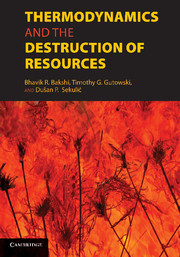Book contents
- Frontmatter
- Contents
- Contributor List
- Foreword by Herman E. Daly
- Foreword by Jan Szargut
- Preface
- Introduction
- PART I FOUNDATIONS
- PART II PRODUCTS AND PROCESSES
- PART III LIFE-CYCLE ASSESSMENTS AND METRICS
- 9 Using Thermodynamics and Statistics to Improve the Quality of Life-Cycle Inventory Data
- 10 Developing Sustainable Technology: Metrics From Thermodynamics
- 11 Entropy Production and Resource Consumption in Life-Cycle Assessments
- 12 Exergy and Material Flow in Industrial and Ecological Systems
- 13 Synthesis of Material Flow Analysis and Input–Output Analysis
- PART IV ECONOMIC SYSTEMS, SOCIAL SYSTEMS, INDUSTRIAL SYSTEMS, AND ECOSYSTEMS
- Appendix: Standard Chemical Exergy
- Index
- References
13 - Synthesis of Material Flow Analysis and Input–Output Analysis
Published online by Cambridge University Press: 01 June 2011
- Frontmatter
- Contents
- Contributor List
- Foreword by Herman E. Daly
- Foreword by Jan Szargut
- Preface
- Introduction
- PART I FOUNDATIONS
- PART II PRODUCTS AND PROCESSES
- PART III LIFE-CYCLE ASSESSMENTS AND METRICS
- 9 Using Thermodynamics and Statistics to Improve the Quality of Life-Cycle Inventory Data
- 10 Developing Sustainable Technology: Metrics From Thermodynamics
- 11 Entropy Production and Resource Consumption in Life-Cycle Assessments
- 12 Exergy and Material Flow in Industrial and Ecological Systems
- 13 Synthesis of Material Flow Analysis and Input–Output Analysis
- PART IV ECONOMIC SYSTEMS, SOCIAL SYSTEMS, INDUSTRIAL SYSTEMS, AND ECOSYSTEMS
- Appendix: Standard Chemical Exergy
- Index
- References
Summary
Introduction
For a model of a production process to be valid in the real world, it has to take proper account of the principles of thermodynamics. Production models in economics are no exception. The conservation of mass requires that proper attention be paid to the mass balance between inputs and outputs entering and leaving a given production process. An increase of entropy implies the generation of process waste in the production phase and the reduction in the purity of materials in the use and end-of-life (EoL) phases. Because process waste is generated in the production phase, it should be classified as an output if the mass balance between inputs and outputs is to be established. The reduction in the purity of materials in the use phase is relevant for materials made of polymers, such as paper, textile, and plastics, whose chemical bindings loosen over time.
On the other hand, for metals such as iron, copper, or aluminum, such a decline in quality in the use phase will not occur [except for possible corrosions (oxidization)] because these metals are elements. In fact, it is not the use phase but the EoL phase in which a serious reduction in the quality of metal materials can occur because of the mixing-up of diverse metal elements or the “contamination” of pure elements with other elements in minor quantities (tramp elements).
Information
- Type
- Chapter
- Information
- Thermodynamics and the Destruction of Resources , pp. 334 - 362Publisher: Cambridge University PressPrint publication year: 2011
References
Accessibility standard: Unknown
Why this information is here
This section outlines the accessibility features of this content - including support for screen readers, full keyboard navigation and high-contrast display options. This may not be relevant for you.Accessibility Information
- 1
- Cited by
